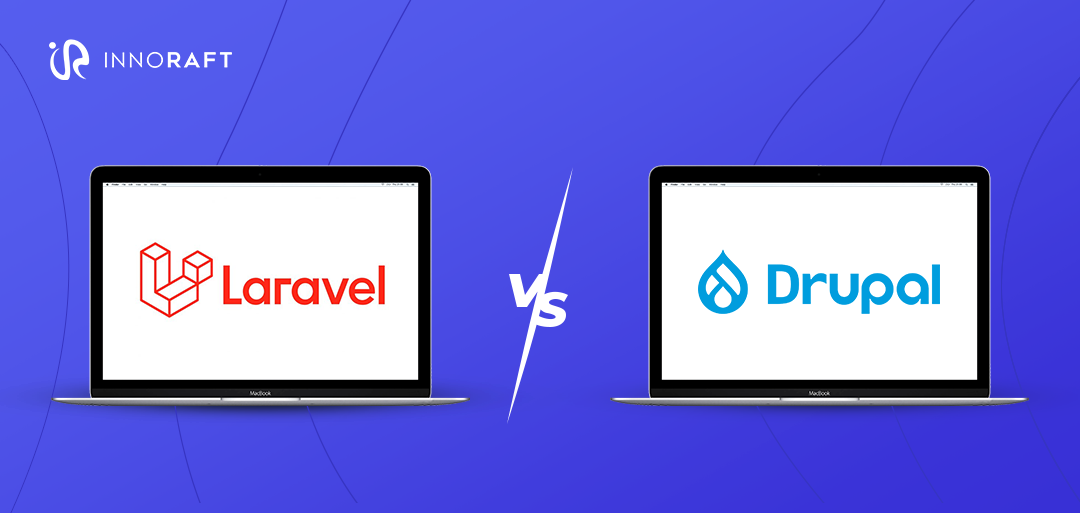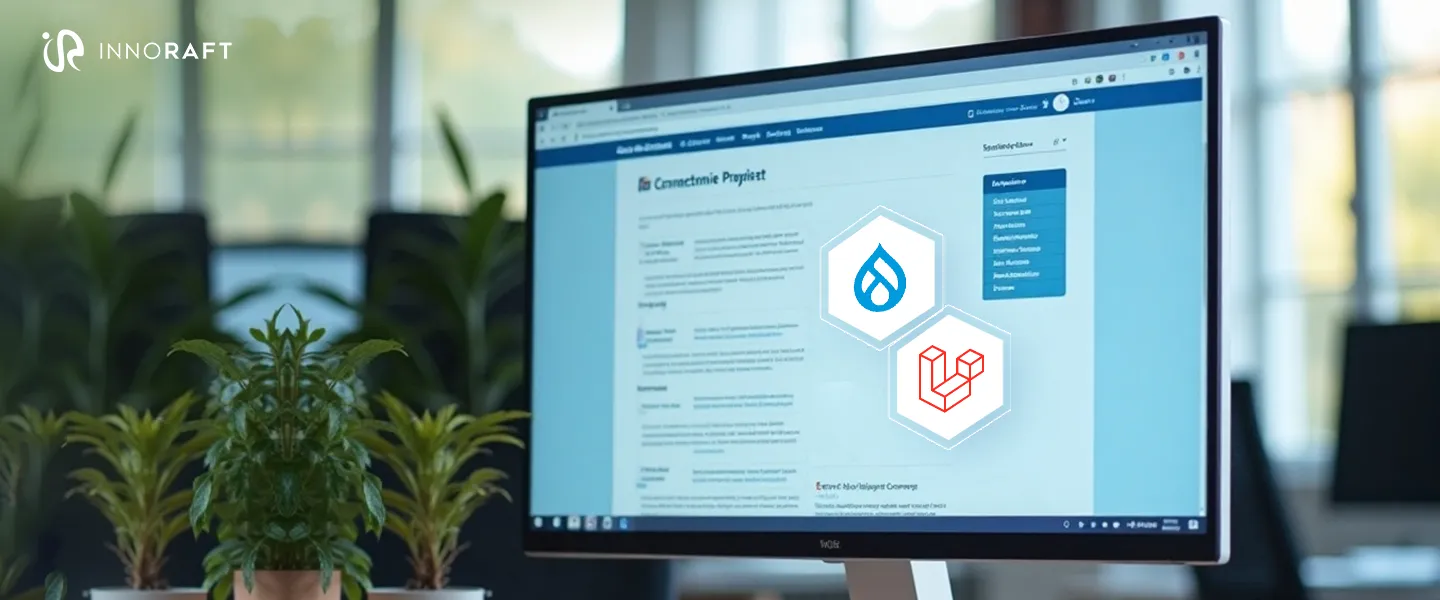Choosing an appropriate platform or content management system (CMS) in today's changing web development environment is fundamental to the survival of the project. Laravel, a PHP framework for web application development, and Drupal, a powerful and flexible CMS, are two approaches with varying methodologies for web application construction. This Laravel vs Drupal tutorial will explore the major features and distinctions between Drupal and Laravel and offer useful information to assist you in deciding which platform is best suited for your web development projects.
When embraced, Drupal CMS may manage content operations and administrative activities, whereas Laravel handles application logic, API handling, and specific business functionalities.
Overview of Drupal and Laravel
Drupal and Laravel have demonstrated their significance in the constantly evolving web development industry.
The Laravel framework is an open-source framework for PHP technology over Symfony code. It aims toward the development of web applications following the model-view-controller (MVC) architecture. Readable and elegant code brought forward by Laravel facilitates the rapid development of web applications.
Drupal is a free content management framework (CMF) that’s built with PHP and comes under the GNU General Public License. Drupal provides developers with the functionality to create and manage everything from a simple personal blog to an enterprise-level complex application. Since it is modular, you can easily add various modules and extensions, which offer you a wide range of features from the start.
Laravel vs Drupal - Comparison
This comparison is worth understanding if you are unsure which is an iconic grab for your future project.
Easy-to-use and Flexible
Regarding usability and adaptability, Laravel and Drupal offer distinct capabilities. The Laravel framework provides an intuitive syntax that enables developers to create code quickly and effortlessly. Its built-in tools, including authentication systems and database migrations, would allow developers to design secure and scalable web applications.
With Drupal, although it is quite well known for highly flexible and scalable services up to a certain level. It has lots of modules and themes available to customize the functionality and look of your site. Drupal's multilingual capabilities also make it a superb content management system for organizations having international reach. Nevertheless, project requirements and user experience goals will determine which CMS is best suited for your web development.
Performance, Scalability, and Security
Drupal and Laravel provide advanced features in terms of performance, scalability, and security. Laravel is very speed-optimized and can be easily managed with heavy traffic volume. A caching system optimizes performance by minimizing database queries. Laravel's tools prevent SQL injections and other vulnerabilities, providing a safe web application development environment.
Drupal's modularity ensures that new features can be added or existing ones removed easily. It also scales horizontally across many servers. Using advanced data security functionalities such as access controls and user permissions, Drupal prevents any unauthorized user from entering your site's content.
The comparison of Laravel vs Drupal has many options available on each platform, depending on user-specific performance, scalability, and security needs. So ultimately, it would depend on which platform would best suit the needs of the organization and its budget.
Community Support
Laravel has a large developer community that has created a diverse set of libraries, plugins, and modules to enhance its functionality. This implies that accessing resources and help is easy when using Laravel.
Drupal CMS is also recognized for its active community. Engaged contributors work on various platform-related issues, such as security upgrades, rectifying bugs, and new features. Due to its complexity, mastering Drupal may require a steeper learning curve compared to Laravel.
Mobile Application Development
While Laravel is predominantly a backend framework, it may also power mobile applications. Laravel Nova or API resources may be leveraged to make backend functionality available for mobile app integration. Laravel's API-centric design makes it easier to create sophisticated, secure APIs.
With Decoupled Drupal, developers are free to use Drupal as the backend content repository while developing the front end in another technology stack so as to create a flexible and interactive mobile application.
Optimized Server Resource Management
As an interpreted PHP framework, Laravel may use more server resources than frameworks built in lower-level languages. Yet, the simplicity of use, broad feature set, and developer-friendly environment often justify the resource burden.
Several factors, including the complexity of content structures, the number of installed modules, and the effectiveness of caching methods, determine Drupal's resource usage. Appropriate server configuration and optimization procedures are vital for achieving maximum performance and resource efficiency in Drupal-based sites.
Cost Effectiveness
Regarding cost-effectiveness, Laravel is often the favored choice for small enterprises or startups because it is free and requires no license or subscription fees. In contrast, Drupal has a higher initial cost, as it requires technical skills throughout development. However, due to its scalability, it is often regarded as a worthwhile long-term investment.
Integrated Ecosystem with Third-Party Solutions
Laravel's ecosystem is broad and diversified, with many third-party packages available via Composer. Laravel Forge streamlines server setup and deployment, while Laravel Mix simplifies asset compilation. Package and integration accessibility improve the development workflow and enable various use cases.
The environment for Drupal is massive, being characterized by the availability of many modules and themes that are generally developed by the community. The Drupal Marketplace is hailed as a sole portal for developers to share and find the extensions. Hence, Drupal's capability makes it part of all the web development use cases, with a great facility for integrating with third-party services.
Key Differences in Implementation
The variations between Drupal and Laravel extend beyond their primary attributes and include their respective implementation methodologies. In building applications from scratch using Laravel, you need a development team well versed in PHP. Drupal as a CMS allows administrators and content editors to manage and update websites easily, actually not requiring much technical know-how.
Laravel offers more customization of web app functionality and appearance, but it requires more investment of developer time and expertise. On the other hand, the solid modular framework and rich library of pre-built modules make Drupal an easier tool for building and deploying.
Future Trends in Drupal and Laravel Development
As technology evolves, decoupled architectures are becoming increasingly popular. In Drupal, the JSON:API module is now the standard for exposing content to front-end frameworks like React, Angular, or Flutter, enabling fully headless Drupal or hybrid applications. Similarly, Laravel is pushing serverless deployment through Laravel Vapor, allowing scalable and cost-effective hosting on AWS without managing traditional servers. Embracing these innovations ensures that your Drupal or Laravel projects remain highly flexible, scalable, and future-proof.
Final Thoughts
Your project type and specific specifications will determine whether it will be Laravel or Drupal for your web development project. Because of its large flexibility, Laravel is an excellent choice for developing custom web applications with especially complex business logic. On the other hand, Drupal CMS excels at content management and is the best choice for large-content websites and community portals. Both can do wonders when used rightly.
As a leading Drupal agency in India, Innoraft is your trusted partner for everything in Drupal. We provide end-to-end Drupal services to help you develop long-term relationships with your audience through a smooth, future-forward digital experience.
